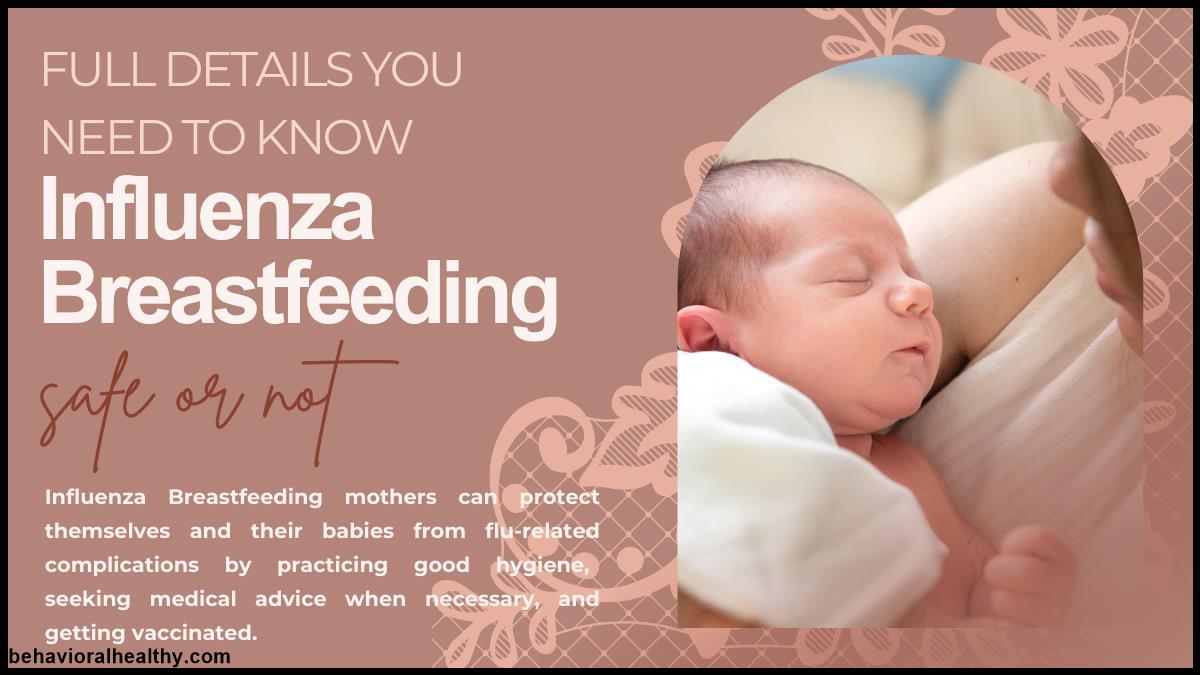Influenza breastfeeding is caused by viruses that attack the respiratory system, resulting in symptoms including fever, cough, body aches, and fatigue.
Table of Contents
Influenza and Breastfeeding: Everything Nursing Mothers Need to Know
Influenza, or the flu, is a common virus that impacts millions of people every year. Especially nursing mothers experience more struggles and problems during this time. Breastfeeding offers crucial antibodies that protect babies from illness, including respiratory infections like the flu, according to the Centers for Disease Control and Prevention (CDC).
Still, babies may face severe flu complications, so mothers must take precautions while ensuring that their children receive the best nourishment possible. This guide will help you know about Influenza Breastfeeding and how influenza may affect the baby's health.
Influenza and Its Effects on Breastfeeding
Influenza is caused by viruses that attack the respiratory system, resulting in symptoms including fever, cough, body aches, sore throat, and fatigue. The flu spreads mainly through airborne droplets when an infected person coughs, sneezes, or talks. It may also be spread through contaminated surfaces.
Benefits of Breastfeeding During Influenza
Breastfeeding has many benefits, especially during flu season:
- Antibody Insulation: Breast milk contains antibodies, which help keep babies from getting sick and can help prevent serious flu complications.
- The Best Nutrition: Breast milk is the most complete source of nutrition for a baby, even if a mother is ill.
- Lower Risk of Secondary Infections: Breastfed babies may be less likely to develop secondary infections, such as pneumonia or bronchitis.
- Comfort and Bonding: Breastfeeding is a comforting process and emotional bonding; a sick baby needs comfort and reassurance, and such a process positively interacts with emotional well-being.
Precautions for Breastfeeding Mothers with Influenza
Influenza Breastfeeding is safe; however, mothers should take precautions to avoid transmitting the virus to their babies. These precautions include:
Proper Hand Hygiene
One of the best ways to prevent the spread of germs is by washing hands often with soap and water for 20 seconds or more. If soap and water are not available, it is recommended to use an alcohol-based hand sanitizer containing at least 60% alcohol.
Wearing a Mask
Breastfeeding mothers with flu symptoms should wear masks when nursing their babies or handling them to decrease the risk of illness transmission through respiratory droplets.
Cough and Sneezing Guidelines
When sneezing or coughing, covering your mouth and nose with a tissue or your elbow helps prevent the spread of infectious droplets. Tissues that have been used should be disposed of immediately, and hands should be washed.
Limiting Close Contact
Avoid being face-to-face with the baby whenever possible, especially with flu-like symptoms. Holding and cuddling should be done carefully for limited exposure.
Cleaning and Disinfecting of Surfaces
To reduce the spread of germs, regularly disinfect things that are commonly touched by people, such as doorknobs, baby bottles, or pumping equipment.
When Breastfeeding Is Challenging
For some women, flu symptoms like severe fatigue, fever, and body aches can make breastfeeding physically difficult. In those instances, other approaches can be taken to keep getting breast milk to the baby:
Expressing Milk
Mothers who do not feel well enough to nurse directly can express milk using a hand pump or an electric breast pump. Expressed milk should be properly stored and given to the baby using a clean bottle or cup.
Enlisting Help
A healthy caretaker can feed expressed milk to the baby, minimizing contact between a mother and child while still keeping the baby well-fed.
Ensuring Hydration and Nutrition
Even with no appetite due to illness, mothers should try to stay hydrated and continue eating healthful meals to keep their milk supply for their babies.
Cold and Flu Medications and Breastfeeding
Most nursing mothers are afraid to take medicines for flu symptoms, concerned that it may reach their baby. But there are antiviral medications and self-medication remedies that are safe:
- Prescribed antiviral medications: Oseltamivir (Tamiflu) and Zanamivir (Relenza) are often prescribed for flu treatment and are generally safe for breastfeeding mothers.
- Pain Relievers: Acetaminophen (Tylenol) and ibuprofen (Advil, Motrin) can relieve fever and body aches.
- Decongestants: Nasal saline sprays and steam inhalation are both preferred, as oral decongestants can decrease milk supply in some women.
It is also important to consult a healthcare provider before taking any medications because the medicine taken by the mother should be safe for both mother and baby.
Importance of Flu Vaccination for Breastfeeding Mothers
Flu vaccination during breastfeeding is recommended by both the CDC and the World Health Organization (WHO). The flu vaccination is safe for pregnant and nursing women and offers many benefits:
- Protects the Mother: If infection does occur, it makes flu symptoms less severe and shorter-lived.
- Impending Immunity for the Baby: Antibodies from the vaccinated mother transfer to the baby via breast milk, providing extra immunity.
- Reduced Risk of Severe Disease: Becoming infected can lead to multiple severe complications that would necessitate hospitalization.
You can find flu vaccines through clinics, hospitals, and pharmacies, which means mothers who want to protect themselves and their babies readily have the option.
When to Seek Medical Help
Although the majority of flu cases resolve within a week, some symptoms can signal complications that need medical attention:
- A rise in breathlessness or the experience of hemoptysis
- Persistent high fever
- Severe dehydration (nodules, dry mouth, dizziness)
- Chest pain or pressure
- Lethargy or extreme fatigue
- Symptoms after improvement get worse
Mothers with these extreme symptoms should get prompt medical care.
To Conclude
Breastfeeding with influenza requires careful consideration of hygiene and health practices. Influenza Breastfeeding mothers can protect themselves and their babies from flu-related complications by practicing good hygiene, seeking medical advice when necessary, and getting vaccinated. However, consult your healthcare provider for personalized advice to ensure both mother and child are safe during flu season!

